
What can we learn by reflecting on Robin Waterfield’s take on Xenophon’s Anabasis, the Persian Expedition?
The Anabasis is Xenophon’s remarkable eyewitness account of the Greek mercenary army hired by Cyrus the Younger. Cyrus was challenging his brother Artaxerxes for the throne of Persia.
Although the Ten Thousand Greek hoplites won the battle militarily, this win was wasted when a spear ran through their patron Cyrus, killing him in battle.
Stranded behind enemy lines, and with many of their generals murdered by the treacherous Persians at a banquet, they elected Xenophon as the main general to lead them on their march for many miles and many months through enemy territory before they reached the Greek colonies on the shores of the Black Sea.
The modern historian and translator Robin Waterfield has many interesting insights on this adventure story and the Greco-Persian conflicts that preceded it.
YouTube Script with more Book Links:
https://www.slideshare.net/BruceStrom1/robin-waterfield-reflects-on-xenophons-anabasis-in-persia-and-other-grecopersian-conflicts
Video for this blog: https://youtu.be/sOZAKFfEnKw
THE HISTORIAN ROBIN WATERFIELD PROVIDES A VALUABLE PERSPECTIVE
We have reflected on Xenophon’s remarkable account of this adventure, the Anabasis. In this adventure, by Cyrus the Younger and his rebel Persian army, with the Greek mercenary army, marches thousands of miles to battle the main Persian forces near Baghdad, deep in the desert on the banks of the mighty Tigris and Euphrates Rivers.
The Greek hoplite infantry forces were the best warriors of their time, they were eagerly employed as mercenaries in the ancient world. The Greeks won the Battle of Cunaxa, and although Artaxerxes was wounded in the battle, his younger brother Cyrus died fighting. The Greek forces were stuck thousands of miles from home, but the Persian forces of Artaxerxes were fearful of directly attacking them. At first, the Persians guided them north towards the Greek colonies of the Black Sea, but then they double-crossed them, killing many of their generals. The Greeks simply elected new generals, with Xenophon now leading their forces, as they first fought the Persians, then mountain tribesmen, fighting for provisions, as they retreated to the Greek colonies on the shores of the Black Sea.
Xenophon’s Anabasis: The Persian Expedition, an Ancient Adventure Story
https://seekingvirtueandwisdom.com/xenophons-anabasis-the-persian-expedition-an-ancient-adventure-story/
https://youtu.be/DBG3JvyLP1E
Robin Waterfield has much background history that is either missing or underemphasized in Xenophon’s history of this long retreat of the Ten Thousand to the Black Sea, which includes the fascinating Persian court intrigues. Waterfield also answers several questions we had when reflecting on the Greco-Persian Wars, and he also has some insights into the Peloponnesian Wars that followed, where the Persians bankrolled the eventual victory of the Spartans over the Athenians.
Summary of the Peloponnesian Wars Between Athens and Sparta
https://seekingvirtueandwisdom.com/summary-of-the-peloponnesian-wars-between-athens-and-sparta/
https://youtu.be/SW9Zq4IiLF0
Summary of Greco-Persian Wars, Herodotus, Plutarch and Aeschylus Celebrate Greek Victory
https://seekingvirtueandwisdom.com/summary-of-greco-persian-wars-ancient-historians-herodotus-plutarch-and-aeschylus-celebrate-greek-victory/
https://youtu.be/frBzSQVala4
Histories of Herodotus, The Greeks Defeat the Mighty Persians in the Greco-Persian Wars
http://www.seekingvirtueandwisdom.com/histories-of-herodotus-the-greco-persian-wars/
https://youtu.be/JjNcyLo54ko
The Greeks Triumph in the Battle of Salamis, Aeschylus and Herodotus: The Greco-Persian Wars
http://www.seekingvirtueandwisdom.com/aeschylus-and-herodotus-the-battle-of-salamis-greco-persian-wars/
https://youtu.be/cabAkQwHnlk
GREEK COLONIES IN ASIA MINOR, BLACK SEA, AND SICILY
The Greek colonies both in Ionia on the west coast of Asia Minor, and on the north coast on the shores of the Black Sea, played a major role in the Greco-Persian Wars, and in the subsequent wars and Xenophon’s adventure. Many Greek colonies were established as early as the eighth through the sixth centuries BC across the Mediterranean Sea and on the shores of the Black Sea. When a Greek city-state was unable to provide for all its citizens, it asked for volunteers to colonize distant shores of the Mediterranean, which many historians call an ancient Greek pond. Although the main city-state assisted in their founding, they were not colonies in the modern sense, like the colonies of the British Empire. These colonies were independent city-states with only emotional and historical ties to their mother city-state. Sometimes the colony and the mother state would oppose each other. For example, the first Peloponnesian War was sparked by a conflict between Corinth and her colony Corcyra.
https://en.wikipedia.org/wiki/British_Empire
The colonies in Ionia, which are on the islands and west coast of what is Turkey today, were often controlled by the Persian Empire, although they were briefly free after the Greco-Persian Wars. The Greek colonies on the shore of the Black Sea on what is the northern coast of Turkey today were usually not controlled by Persia. The Athenian Empire relied on trade with the Greek colonies on the shores of the Black Sea for grain to feed its citizens. The main Greek colony of Syracuse in Sicily won a major battle against the Athenians in the final Peloponnesian War.[1]
GREEKS ARE VICTORIOUS IN GRECO-PERSIAN WARS
In the last decade of the sixth century BC, an expanding Sparta was threatening to annex the then-insignificant Athens into its land empire. The Athenian aristocrat Cleisthenes, who passed reforms that would strengthen democracy in Athens, sent an envoy to investigate the possibility of an alliance with King Darius I of Persia, as Athens was being threatened by Sparta. Darius told the envoy that an alliance was possible only if Athens consented to become a vassal state of Persia. The envoy felt compelled to accept this condition.
Back in Athens, the crisis had passed, so they repudiated the agreement to become vassals of Persia, which irritated Darius. Relations grew worse when Aristagoras of Miletus in Ionia rebelled against Persia, seeking independence. Athens unwisely sent twenty triremes with hoplites. The Greeks foolishly attacked Sardis, the capital of the regional Persian satrapy, burning the residential areas of the town before turning back.
In retaliation, Darius decided to sail a modest Persian force to subjugate Athens, to make her a vassal state of the Persian Empire. Most Greek city-states declined to assist Athens, fearing the wrath of Persia. Sparta claimed she was busy with a religious festival; she did not want to anger the god Apollo. Only the hoplites from Athens and the small city-state of Platea faced down the mighty Persian Empire, winning a surprising victory in the Battle of Marathon.
The ancient historian Herodotus, in his account of the Battle of Marathon, does not answer the question: Why didn’t the Persian cavalry fight in this battle? Some scholars theorize that the horses could not charge in the marshes surrounding the battlefield. But Robin Waterfield has another more plausible answer to this question.
Robin Waterfield says that the “Greeks had encamped on rising ground to dissuade a Persian attack, and the two sides watched each other for several days. The Persians became bored with the stalemate and decided to reembark and sail around the Attic peninsula to attack Athens more directly. When the formidable Persian horsemen were out of the way, boarding the ships, the Athenians and Plataeans moved down the slope, ten thousand Greek hoplites facing twenty thousand or more Persians, and charged, to minimize the amount of time they were vulnerable to the Persian arrows.”
Robin Waterfield continues, “In the center, the Athenians only just managed to hold their ground,” “but the two wings” “were victorious. They routed the enemy, but with admirable discipline turned to assist the center, rather than pursue their fleeing opponents.” This was not done later in the Battle of Cunaxa. “Before long the entire Persian army was withdrawing in disarray to their beached ships. After some bloody hand-to-hand fighting right by the ships, the Persians managed to take to the safety of their ships.” “The Athenians lost 192 men, while the lighter-armed Persians lost over six thousand men; the ghosts of dead men and horses were said in later years to haunt the battleground every night.”
The Persian ships then sailed around the peninsula to attack and sack the unguarded city of Athens. The Greeks marched quickly to the beaches of Athens and were there to meet the Persian ships. Seeing that their landing would be opposed, King Darius and his forces sailed back to Persia.
The Greeks knew the Persians would be returning, and in greater numbers. But before Darius could mount another larger force against Greece, there were rebellions in Egypt and Babylon. When he passed away in 486 BC, his son Xerxes had to first stabilize his rule before organizing a more substantial invasion of Greece.
A conference of Greek states was held in Corinth in 491 BC, only about five percent of Greek city-states sent delegates, the participating city-states decided that Sparta would lead the defensive efforts. Not only did many smaller Greek city-states fear the Persian Empire, but they also knew that the Persians ruled with a light hand, permitting cultural and religious diversity, only exacting payment of tribute.
Major preparations were made for this invasion, this time a much larger army would march around the coast, fording the Dardanelles with a double pontoon of boats, with a substantial navy following the army off the coast. The Persians even dug a two-kilometer canal across the Athos peninsula so the ships would not have to risk the stormy seas in the area.
First, a small Greek force held the much larger Persian army at the narrow Pass of Thermopylae for several days, until a traitor showed the Persians a mountain trail bypassing the pass. Then the famous Spartan Three Hundred fought the Persians to the death. The Athenians evacuated their inhabitants to safety on the island of Salamis and elsewhere, the Persians sacked Athens unopposed.
Histories of Herodotus, The Greeks Defeat the Mighty Persians in the Greco-Persian Wars
http://www.seekingvirtueandwisdom.com/histories-of-herodotus-the-greco-persian-wars/
https://youtu.be/JjNcyLo54ko
The Greek leader Themistocles tricked the Persian navy into blockading the Greek fleet in the straits of Salamis, keeping them from escaping. This mainly meant that the Persian sailors pulled an all-nighter guarding the straits and had to fight the Greek navy in the morning without a proper breakfast, and likely without drinking water. The superior seamanship of the Athenian rowers meant that their triremes sank many Persian ships, winning a major victory. Like his father, King Xerxes sailed back to Persia, along with the least effective soldiers.[2]
The Greeks Triumph in the Battle of Salamis, Aeschylus and Herodotus: The Greco-Persian Wars
http://www.seekingvirtueandwisdom.com/aeschylus-and-herodotus-the-battle-of-salamis-greco-persian-wars/
https://youtu.be/cabAkQwHnlk
The core of the Persian army marched north to winter with the Persian ally King Alexander of Macedon, but this large army was slaughtered in battles in central Greece in the following spring, with only a few Persian soldiers escaping. Many generations later it would be Alexander the Great of Macedon who would defeat the Persian Empire.
FIRST PHASE OF PELOPONNESIAN WARS
The fifty-year period from the end of the Greco-Persian Wars, when the Persians were defeated, to the beginning of the Peloponnesian Wars, is called the Pentecontaetia by the ancient historian Thucydides. With the Persian morale broken and many of their ships sunk, many of the Greek city-states in Ionia successfully revolted against Persian rule.
The Spartans initially led this effort, but as Robin Waterfield says, “The Spartan regent Pausanias, in charge of land operations against the Persians in Asia Minor, was an arrogant, unlikeable man, and he made the mistake of appearing too familiar with his supposed enemies. The rumors spread thick and fast. They said that he had contracted to marry the daughter of a Persian satrap,” or regional governor, and “that he had agreed to abandon Asian Minor to the Persians.”
In response, the Ionian Greeks requested that Athens form the Delian League, an alliance of Athens and the Ionian city-states to protect them from Persia. This Delian League gradual evolved into the Athenian Empire. Many larger city-states benefited from increased commerce by belonging to the Delian League, while other city-states chafed under Athenian rule, resentful of the tribute they paid to Athens.
Plutarch: Lives of Aristides and Cimon, Formation of the Delian League After the Greco-Persian Wars
http://www.seekingvirtueandwisdom.com/plutarch-lives-of-aristides-and-cimon-formation-of-the-delian-league-after-the-greco-persian-wars/
https://youtu.be/QabwtFANCDc
The Athenian leader Pericles, convinced that armed struggle with Sparta was inevitable, planned for the first phase of the Peloponnesian Wars, which was a war of attrition: Sparta would repeatedly raid the Athenian farms, while the Athenian fleet would attack the far-flung territories of Sparta and her allies. Pericles died in the plague struck the Athenians crowded behind the city walls, and the Peace of Nicias was negotiated.
Thucydides and Plutarch: Pericles and the Radical Democracy Before the Peloponnesian Wars
http://www.seekingvirtueandwisdom.com/thucydides-and-plutarch-pericles-and-the-radical-democracy-before-the-peloponnesian-wars/
https://youtu.be/uhtGzfxVdzk
Thucydides and Plutarch: Pericles and the Beginning of the Peloponnesian War Between Athens and Sparta
http://www.seekingvirtueandwisdom.com/thucydides-and-plutarch-pericles-and-the-beginning-of-the-peloponnesian-war-between-athens-and-sparta/
https://youtu.be/1ra58mg33nM
Pericles Funeral Oration & Plague, Lincoln Gettysburg Address, Churchill Battle of Britain Speech
https://seekingvirtueandwisdom.com/pericles-funeral-oration-plague-lincoln-gettysburg-address-churchill-battle-of-britain-speech/
https://youtu.be/wyjWBAG6xrc
From the Death of Pericles to the Peace of Nicias, Peloponnesian War, Thucydides and Plutarch
https://seekingvirtueandwisdom.com/from-the-death-of-pericles-to-the-peace-of-nicias-peloponnesian-war-thucydides-and-plutarch/
https://youtu.be/szi7-9QQWI0
ALCIBIADES RESTARTS THE PELOPONNESIAN WARS
The Peace of Nicias was interrupted when the cocky, charismatic Alcibiades, who was raised in the household of Pericles, persuaded the Athenian Assembly to commit a large portion of the Athenian navy to the Sicilian Expedition. Alcibiades had many enemies in the radical democracy of Athens, after the fleet set sail, he was summoned to a trial in the Assembly on trumped-up charges for acts offensive to the gods, a trial where he would lose since those in the fleet could not vote. He fled to exile in Sparta, leaving the timid Nicias to lose the battle through indecision, where most of the Athenian navy was destroyed, with over ten thousand Athenians slaughtered. Athens had lost a quarter of its population due to a plague, this added to their catastrophic loss of manpower.
Athens’ Disastrous Defeat at Syracuse in the Sicilian Expedition, the Peloponnesian Wars
https://seekingvirtueandwisdom.com/athens-disastrous-defeat-at-syracuse-in-the-sicilian-expedition-the-peloponnesian-wars/
https://youtu.be/SaIqQ35ysl4
Alcibiades then offered good advice to the Spartans, which enabled them to prevail against Athens in the war. But the outrageous Alcibiades seduced and impregnated the Spartan queen, causing him to be exiled from Sparta also. So, he fled to the court of the Persian satrap Tissaphernes, they became fast friends. Following the advice of Alcibiades, Tissaphernes adopted a policy of supplying the Spartans just enough to keep them in the fight, but not assuring either side of a victory, so that Persia could swoop in and control Greece once the two sides had exhausted each other.
Alcibiades was playing a double game: he told the Athenians he was driving a wedge between Tissaphernes and Sparta. But when Tissaphernes hinted he might finance the Athenians, the Spartans abandoned him and received aid from the other Persian satrap Pharnabazus.
Comeback of Alcibiades in Peloponnesian War, according to Plutarch, Thucydides, and Xenophon
https://seekingvirtueandwisdom.com/comeback-of-alcibiades-in-peloponnesian-war-according-to-plutarch-thucydides-and-xenophon/
https://youtu.be/b7QLp1HrOMs
Alcibiades talked himself into the good graces of the Athenian fleet posted in the Aegean Sea, under his command they won victory after victory. He was welcomed as a conquering hero in Athens, but the Athenians became too accustomed to his victories. He was exiled once again after a minor defeat. The successor generals were both timid and careless, they allowed their trireme naval crews to beach and go into town. The Spartan general Lysander caught them by surprise, destroying the Athenian navy, leading to the total defeat of Athens.
Spartan Lysander Shows Mercy on Athens, Ending the Peloponnesian Wars
https://seekingvirtueandwisdom.com/spartan-lysander-shows-mercy-on-athens-ending-the-peloponnesian-wars/
https://youtu.be/giNzqNoOH3Y
INTRIGUES OF THE PERSIAN COURT INFLUENCE EVENTS
What we did not discuss in depth in Xenophon’s account was how the intrigues of the Persian court affected Persian policies in the Peloponnesian Wars and afterwards; including the decision of Cyrus the Younger to attempt to overthrow his brother.
When King Artaxerxes I died, the throne passed to his son, King Xerxes II. But after only a month and a half, he was murdered by his brother Sogdianus. His illegitimate brother Ochus rebelled, executing him, seizing the throne under the name of King Darius II, with help from his wife Parysatis. Queen Parysatis had a network of spies and informants; she ordered the execution of several Persians who were a threat to her husband’s throne. [3]
But since Cyrus the Younger later died on the battlefield, in hindsight Robin Waterfield calls him the pampered boy and favored younger son of Queen Parysatis, brought up to believe in his abilities and leadership qualities, much as the future president FDR was pampered and encouraged by his mother. She convinced her husband, King Darius II, to send his young sixteen-year-old son Cyrus the Younger east, giving him military and administrative control of both these satrapies, sidelining both Tissaphernes and Pharnabazus, demoting them to governors of subordinate regions. Cyrus the Younger took over the war effort, developed a close relationship with the Spartan commander Lysander, supplying the Spartan navy and army generously, helping them to win the Peloponnesian Wars.
Cyrus let his youth cloud his judgment when he executed two of his father’s cousins when he thought they did not show him the respect due to a king, although he was only a satrap and not yet a king. His father, King Darius, recalled him to Susa to remind him that he was not a king. Meanwhile, the scheming of Parysatis did not go unnoticed, she became the bitter rival of Cyrus’ older brother’s wife, Stateira, who also involved herself in palace intrigue.
Not long afterward, King Darius fell deathly ill. He sent a message to Cyrus imploring him to allow his older brother to assume the throne in peace. Cyrus returned to Susa, the capital, and remained there for his brother’s coronation, who assumed the royal name of King Artaxerxes II.
But a worrying incident guaranteed that peace between these brothers would be impossible. Robin Waterfield informs us, “Not long before the investiture was to begin, Tissaphernes brought to Artaxerxes one of the priests who had an astonishing tale to tell. Cyrus, he said, was planning to hide himself in the sanctuary and kill Artaxerxes when an opportune moment presented itself. What made the story especially credible was that this priest was close to Cyrus; he had been his boyhood tutor.”
But even so, the story is implausible and makes little sense, perhaps it was even manufactured long after the death of Cyrus. But Queen Parysatis persuaded her older son Artaxerxes to allow his brother to return to his post in Susa.
This distrust led King Artaxerxes to reduce his brother’s power, so he reassigned the Greek Ionian city-states, with their generous tribute payments, to Tissaphernes. Cyrus suspected that his brother would tolerate him only as long as their mother, Queen Parysatis, was alive. This was the period when the satrap Pharnabazus, eager to earn the king’s gratitude, had his agents murder Alcibiades, the former advisor to Cyrus.
Around this time, Queen Mother Parysatis was suspected of poisoning her rival, Queen Stateira. But her son, King Artaxerxes, did not exile or execute his mom for this.
Robin Waterfield also asserts that the aristocratic rulers of the Greek Ionian city-states preferred Cyrus over Tissaphernes since they suspected that Tissaphernes preferred that the Greek city-states adopt a more democratic form of government, which meant that their citizen assemblies would have more power. Only the important city-state of Miletus supported Tissaphernes since he executed or exiled the Milesian aristocrats. These exiles went to the court of Cyrus, who gave them men and assistance to take back Miletus. Perhaps Artaxerxes was relieved that Cyrus was distracted by this conflict, it was not uncommon for Persian kings to exploit conflicts between satraps to weaken them. This meant that Cyrus could assemble forces for his coup attempt under the guise of plotting against Tissaphernes.
Robin Waterfield said that Cyrus “began a propaganda war against his brother,” seeking support among the Persian nobles. Cyrus spread rumors that “his brother was a weakling and a drunkard, who might run a splendid court but would ruin the empire.” “Xenophon tamely agreed with this assessment of Artaxerxes. By contrast, Cyrus saw himself as the chosen of the gods, and a man of vigor: a great hunter and warrior, schooled in the Persian virtues and capable of holding his drink.”[4]
Xenophon, in his Anabasis, speaks of his admiration for his patron, Cyrus the Younger, comparing him to Cyrus the Great.
Xenophon’s Anabasis: The Persian Expedition, an Ancient Adventure Story
https://seekingvirtueandwisdom.com/xenophons-anabasis-the-persian-expedition-an-ancient-adventure-story/
https://youtu.be/DBG3JvyLP1E
Indeed, Xenophon’s fanciful portrait of Cyrus the Great, the founder of the Persian Empire many generations ago, echoes the qualities he most admires in Cyrus the Younger. This loose biography should be read as background for Xenophon’s Anabasis. This biography contains many stoic sayings by Xenophon.
Xenophon’s Cyropaedia, Biography of Cyrus the Great, King of Persia
https://seekingvirtueandwisdom.com/xenophons-cyropaedia-biography-of-cyrus-the-great-king-of-persia/
https://youtu.be/E4BFSIpHHGk
Xenophon’s Cyropaedia, Moral Sayings of Cyrus the Great, King of Persia
https://seekingvirtueandwisdom.com/xenophons-cyropaedia-moral-sayings-of-cyrus-the-great-king-of-persia/
https://youtu.be/Y3ULbvPEmik
Robin Waterfield discusses Xenophon’s judgment of the character of Cyrus the Younger. He cautions that in war, and ancient Greece was definitely a warrior culture, sometimes deceit is needed so you don’t reveal your plans to your adversary. Desertion was endemic in ancient armies; sometimes Greek armies supplied the enemy with false deserters to mislead them of their plans. Cyrus was thus compelled to deceive his brother of his intentions, and thus he was also compelled to deceive the Greek mercenaries of their true mission until they marched deep into Persia, confiding only in his Greek commander, Clearchus. Waterfield observes that Cyrus may not have been quite as widely loved and admired as Xenophon claims, he threatened brutal retaliation if certain Greek forces rebelled. It appears he received scant support from the other satraps and disaffected Persian nobles.
Ancient Warrior Societies, Blog 1, The Warrior Ethos of Ancient Greece, Rome, and Israel
https://seekingvirtueandwisdom.com/ancient-warrior-societies-blog-1-the-warrior-ethos-of-ancient-greece/
https://youtu.be/7QAZ_s6zw4E
Ancient Warrior Societies, Blog 2, Greek and Roman Armies and Navies
https://seekingvirtueandwisdom.com/ancient-warrior-societies-blog-2-greek-and-roman-armies-and-navies/
Ancient Warrior Societies, Blog 3, World of the Old Testament
https://seekingvirtueandwisdom.com/ancient-warrior-societies-blog-3-world-of-the-old-testament/
Ancient Warfare in Ancient Greece, Rome, and Israel. Did Joshua Massacre Pagans in Promised Land?
https://youtu.be/9xKxqAbJ2qY
We included in Robin Waterfield’s biographical notes on Xenophon with other sources, including the ancient biographer Diogenes of Laertius’ Lives of Eminent Philosophers, in our reflections on the life and adventures of Xenophon.
The Life, Adventures, and Philosophy of Xenophon, General and Student of Socrates
https://seekingvirtueandwisdom.com/the-life-adventures-and-philosophy-of-xenophon-general-and-student-of-socrates/
https://youtu.be/lU59WBQu3bc
CYRUS AND GREEKS PREPARE TO MARCH AGAINST ARTAXERXES
Cyrus opened negotiations with Sparta, who was not interested in honoring their obligation to Artaxerxes in guaranteeing that the Greek Ionian city-states would continue paying tribute to Persia. Cyrus promised Sparta a free hand in Greek Ionia, the city-states on the west coast of Asia Minor, if they helped him defeat his brother and seize the throne of Persia.[5]
Robin Waterfield presents some background information on Clearchus, the Spartan general leading the Greek mercenary forces of Cyrus, that is not emphasized in Xenophon’s account. Clearchus occasionally directly disobeyed orders for his personal gain. He had been a Spartan naval commander in the last phases of the Peloponnesian Wars, and was proxenos, or military general, of the area surrounding the small town of Byzantium. He displayed the same high-handedness in dealing with the Ionian Greeks as did Pausanius at the end of the Greco-Persian Wars. Clearchus’ solution to the internal strife in Byzantium was to execute the troublemakers and seize their property for himself. When he was briefly absent from the city, they opened their gates to the Athenians.
The Spartans recalled him, but when he refused to relinquish his post and return to Sparta, they sent an armed force against him, causing him to flee to the court of Cyrus in Greek Ionia. The Spartans then banished him, proclaiming a death sentence on him. This was the Spartan general Cyrus chose to lead his Greek mercenary army.
Robin Waterfield summarizes Xenophon’s thumbnail sketch of Clearchus: “While, in his dealings with his fellow generals, Clearchus usually looked for a consensus before implementing any strategy, his treatment of his men was quite different: he possessed the admirable ability to weld his men into an obedient fighting unit, but” he did this “by making them frightened of his quick temper and random, brutal punishments. Spartan officers were notoriously harsh disciplinarians, but many of the mercenaries were little more than thugs, eager for blood and booty, and a harsh disciplinarian may have been just what was needed to keep them at bay.”[6]
THE GREEK MERCENARY FORCES, AND THE PERSIAN ARMIES
What motivated the Spartans and other Greeks to join the mercenary army of Cyrus the Younger? A large professional army had been fighting in the Peloponnesian Wars for many years, many now sought further glory and booty.
Robin Waterfield explains: “Mercenary pay covered little more than their daily expenses during the campaign. They bought quite a bit of their food, and in many cases, there were dependents to maintain, prisoners to keep alive until they could be sold or ransomed,” and the need to repair fragile equipment. “Nevertheless, mercenaries generally expected to arrive home wealthier than before,” which meant they sought “to profit from booty. It is a distasteful fact of war that soldiers loot: they steal from the corpses of fallen friend and foe alike, if there is no more substantial target available.”
For the upcoming struggle, Artaxerxes commanded an army of about 45,000, the ancient sources overestimate his strength at 400,000, some say 900,000. The Persians had a standing army, the core of the Persian infantry was the Immortals, which always numbered at least ten thousand. The Persian nobility made up the cavalry, riding the sturdy Nesaean breed of warhorses.
Cyrus the Young’s army was about 30,000, including the famous battle-hardened Ten Thousand Greek mercenaries, mostly Spartan hoplites, with a few Athenians and other Greeks, which included Xenophon, former student of Socrates.
As Robin Waterfield states, “The Greek arms, armor, and tactics outclassed anything they faced, even the famous Persian cavalry: no horse, however passionately urged on by its rider, will hurl itself into a solid phalanx, bristling with spears. In a tightly packed phalanx, the spears of the first three lines were long enough to project in front of the first line, if the soldiers had the necessary strength and skill. The most a horseman could do was ride up close enough to discharge a javelin, and even that was difficult to do effectively in the days before saddles and stirrups.” The so-called Ten Thousand consisted of 10,600 Greek hoplites, or heavy-armed infantry, and 2,300 peltasts, or light-armed infantry, from the margins of the Greek world.
https://en.wikipedia.org/wiki/Hoplite
“Xenophon’s The Expedition of Cyrus is an account of astonishing successes: every time the Greek hoplites charged an enemy, the enemy chose to run away rather than engage them at close quarters.”[7] Robin Waterfield has wonderful descriptions of how Greek hoplite armies engaged each other in Greece, perhaps it is better than the sources we used to discuss this topic in our reflections on Herodotus and the Greco-Persian Wars.
Histories of Herodotus, The Greeks Defeat the Mighty Persians in the Greco-Persian Wars
http://www.seekingvirtueandwisdom.com/histories-of-herodotus-the-greco-persian-wars/
https://youtu.be/JjNcyLo54ko
BATTLE OF CUNAXA, THE GREEKS WIN, BUT CYRUS IS KILLED IN BATTLE
We don’t know where the actual battle was fought, the modern name is the Battle of Cunaxa, after the ancient village of Cunaxa.[8]
Cyrus, with his army, approached a massive trench sixty-five kilometers long but was surprised that his brother’s forces were not anywhere nearby. Maybe Artaxerxes was not planning to oppose him? As they crossed the ditch and marched on, discipline became lax, he allowed the army to be strung out in disarray.
Two days later, a Persian nobleman on Cyrus’ staff galloped into camp with news that his brother King Artaxerxes was approaching with a massive army. Cyrus’ army hurried to the front, taking hours to deploy, but in the desert heat, they delayed putting on their heavy armor as long as possible.
They could hear the enemy army rumble towards them. Robin Waterfield describes the moment: “As Artaxerxes’ army approached, the Greeks could see that the enemy was preceded by deadly scythed chariots, whose sharpened blades projected not just to the sides of the axles but swept the ground underneath so that nothing could escape their onslaught. These chariots were a recent Persian invention, specifically designed for the destruction of hoplite phalanxes. The terror of the sight was magnified by a horrible silence: the Persians were not whooping and shouting but marched on steadily in an eerie quiet and with far more discipline than the Greeks had been led to expect.” Since they outnumbered Cyrus’ force, their right flank wrapped around Cyrus’ left flank.
The original plan was for the Greek troops to wipe out the Persian left flank, and then swing around to the center where the two kings’ forces were confronting each other. At the last minute, Cyrus ordered Clearchus, the Greek commander, to instead attack the center, but the Greek, wary of this last-minute change of plan, refused, as in his position the river would cover the phalanxes’ weak right side.
The Greeks won their battle. The Greeks, facing the left wing commanded by the Persian satrap Tissaphernes, advanced towards the Persians at a quick walk. The Greek hoplites in their tight phalanx formation became more confident, they quickened the pace.
As Robin Waterfield puts it, “Soon the Greeks were all running forward, shouting and screaming and banging their shields with the shafts of their spears,” in perfect hoplite formation, of course, “in an attempt not just to demoralize their opponents, but to overcome their own terror at the imminent, brutal shock of contact. But even before they had closed to about 150 meters, which was the most dangerous point, within range of the enemy bows, although at this distance the arrows lacked much penetrative power, most of the Persian left wing” “caved in. Charioteers abandoned their vehicles and ran, horsemen turned tail, foot soldiers dropped their weapons and fled.”
The Greeks slaughtered the fleeing Persians while sustaining only a handful of casualties. The battle was a repeat of the Battle of Marathon when the Athenians first defeated a Persian raiding army in the first Greco-Persian War.
But there was a difference. Tissaphernes rallied some of his horsemen and counter-attacked, with little immediate effect. But then he withdrew, he made it appear like he was fleeing the battlefield, but it was a feint to draw the Greek forces off the main battlefield to keep them from attacking the center, behind the forces guarding Artaxerxes.
What happened in the center of the battle? Robin Waterfield tells us: “With the Greeks off the immediate battlefield, Artaxerxes’ cavalry galloped forward, followed by the Immortals and the rest of the infantry, in an attempt to encircle Cyrus’ right flank, now exposed by the forward movement of the Greeks. Cyrus had to act quickly to come up with a significant counter-threat. He spotted the Persian royal standard with its spread eagle, and led his elite horsemen in a reckless, headlong gallop straight for his brother.”
Robin Waterfield continues: “They broke through Artaxerxes’ cavalry, but at the cost of becoming scattered, and by that time Cyrus’ impetus had carried him deep into the enemy ranks while he was accompanied by rather too few of his bodyguards.” In the melee and chaos of war and pitched battle, both kings were seriously injured, but Cyrus’ wounds were more serious, the killing stab was below the knee, and he died on the battlefield. And, as Robin Waterfield reminds us, “The death of the pretender spelled defeat, whatever happened elsewhere on the field of battle.”
What happened in the rear of the battle? Marauding Persians fought for the baggage carts of the Greeks, the camp followers defended themselves and the supplies as best they could with whatever weapons they could find. Many of these Greeks survived, with some of the supplies and concubines, but much precious food and equipment was lost.
The long day then turned to night, and darkness enveloped the battlefield. As Robin Waterfield tells us, “The Greeks did not yet know that Cyrus was dead, they had no idea that the battle was lost. Given their own apparent success, they probably assumed they had won. Weary and hungry, with bodies chafed sore from the abrasive blend of dust and sweat inside their armor, they returned to the plundered camp.”[9]
THE LONG MARCH OF THE TEN THOUSAND TO THE SEA
The Greek mercenaries won the Battle of Cunaxa, but their victory was for naught since Cyrus, their patron, was dead. The Greek hoplites were the most feared military force of their day, the Persians dared not challenge them in battle. They could not return the way they came through desert and hostile territory. Instead, they chose to go north, Tissaphernes offered to guide them, offering them provisions if they would retreat. We will let Xenophon tell the tale of the march of the Ten Thousand to the Black Sea.
Xenophon’s Anabasis: The Persian Expedition, an Ancient Adventure Story
https://seekingvirtueandwisdom.com/xenophons-anabasis-the-persian-expedition-an-ancient-adventure-story/
https://youtu.be/DBG3JvyLP1E
Halfway through Persia, Clearchus and many other Greek generals are tricked into attending a banquet in the Persian camp, where Tissaphernes orders that the Greeks in their camp be executed, though some were held prisoner for some months. The Greeks elect new generals, and Xenophon is elected as the chief general to lead them towards the Black Sea. They fight the Persians as they retreat, and then fight mountain tribes the Persians were never able to conquer.
After thousands of miles, the Greeks started shouting when marching through the northern mountain passes. Xenophon was at the rear, and rushed forward on horseback, fearing the worst. Robin Waterfield quotes Xenophon: “Xenophon mounted a horse, and with the cavalry rode up to lend assistance, and before long they could make out that the soldiers were shouting ‘Thalatta! Thalatta! The Sea! The Sea!’ Then all the men in the rear began running too, and the pack animals and the horses broke into a gallop. When everyone reached the mountaintop, they immediately fell into one another’s arms, even the generals and company commanders, with tears in their eyes.” In the end, over eight thousand Greeks survived this long and arduous trek.
The trip along the shores of the Black Sea, including how the mercenaries hired themselves out to various rulers, and finally enlisting with the Spartans battling the Persians, takes nearly half of Xenophon’s Anabasis. But Xenophon chose to retire to Greece, settling on an estate given to him by Sparta.
Later, Alexander the Great would relive the resolute tactics and impetuous bravery of Cyrus the Younger on the battlefield, personally charging the bodyguard of King Darius III, causing him to flee into defeat. But Alexander the Great, unlike Cyrus the Younger, first commanded forces in battles less momentous to gain valuable battlefield experience.
DISCUSSING THE SOURCES
If you’re interested in reading this adventure story that was popular in both the ancient world and medieval times, I would read both Xenophon’s account and Robin Waterfield’s commentary. You should also read Xenophon’s fanciful biography of the founder of the Persian Empire, Cyrus the Great, with his description of the warrior virtues he sees in Cyrus the Younger, with many stoic sayings. Robin Waterfield has also written a book on the life of Plato which we plan to cover in the future.
Xenophon wrote the History of My Times where he discusses the ending years of the Peloponnesian Wars where Thucydides left off, and how they transition into the series of wars between all the Greek combatants in the succeeding years. The Peloponnesian Wars permanently weakened Athens, though they partially recovered, but the wars that followed permanently weakened Sparta, with Thebes freeing their helot serf population. This permanent weakening of both Athens and Sparta likely made Greece easier to conquer by Philip of Macedon, before his son Alexander the Great embarked on his conquest of Persian Empire.
Also, there is a great courses series of lectures by Professor John Hale of the Great Courses on the Greco-Persian Wars that we highly recommend. This is not available on Wondrium, but there is a set of lectures on Wondrium on the Persian Empire by John Lee.
[1] https://en.wikipedia.org/wiki/Greek_colonisation
[2] Robin Waterfield, Xenophon’s Retreat, Greek, Persia, and the End of the Golden Age (Cambridge, Massachusetts: Belknap Press of Harvard University Press, 2006), pp. 30-36.
[3] https://en.wikipedia.org/wiki/Darius_II and https://en.wikipedia.org/wiki/Parysatis
[4] Robin Waterfield, Xenophon’s Retreat, pp. 55-68.
[5] Robin Waterfield, Xenophon’s Retreat, pp. 69-70.
[6] Robin Waterfield, Xenophon’s Retreat, pp. 72-74.
[7] Robin Waterfield, Xenophon’s Retreat, pp. 1-5.
[8] Robin Waterfield, Xenophon’s Retreat, p. 1.
[9] Robin Waterfield, Xenophon’s Retreat, pp. 14-19.

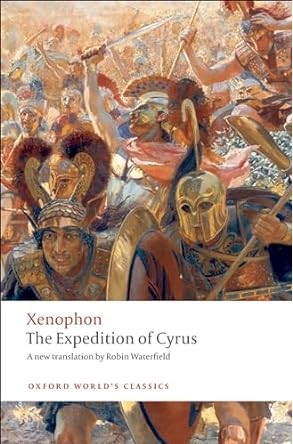
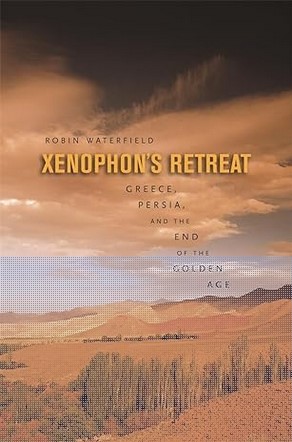
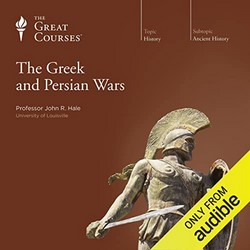

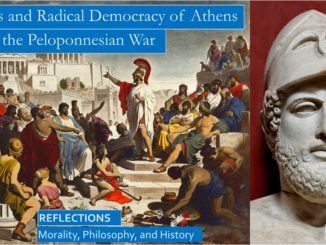
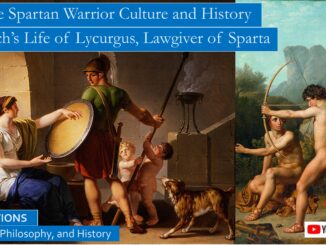
1 Trackback / Pingback